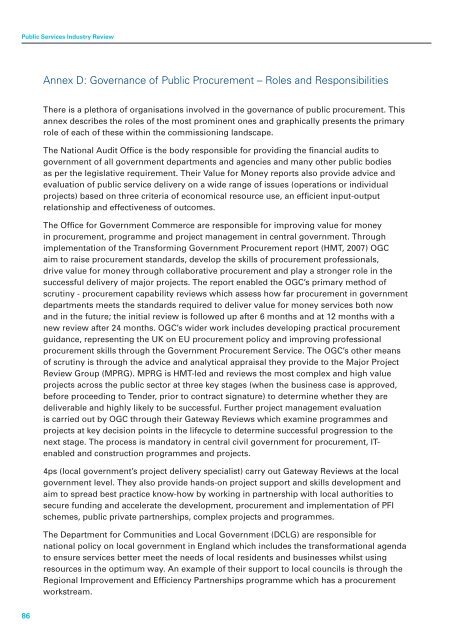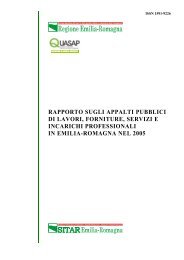Understanding the Public Services Industy
Understanding the Public Services Industy
Understanding the Public Services Industy
Create successful ePaper yourself
Turn your PDF publications into a flip-book with our unique Google optimized e-Paper software.
<strong>Public</strong> <strong>Services</strong> Industry Review<br />
Annex D: Governance of <strong>Public</strong> Procurement – Roles and Responsibilities<br />
There is a plethora of organisations involved in <strong>the</strong> governance of public procurement. This<br />
annex describes <strong>the</strong> roles of <strong>the</strong> most prominent ones and graphically presents <strong>the</strong> primary<br />
role of each of <strong>the</strong>se within <strong>the</strong> commissioning landscape.<br />
The National Audit Office is <strong>the</strong> body responsible for providing <strong>the</strong> financial audits to<br />
government of all government departments and agencies and many o<strong>the</strong>r public bodies<br />
as per <strong>the</strong> legislative requirement. Their Value for Money reports also provide advice and<br />
evaluation of public service delivery on a wide range of issues (operations or individual<br />
projects) based on three criteria of economical resource use, an efficient input-output<br />
relationship and effectiveness of outcomes.<br />
The Office for Government Commerce are responsible for improving value for money<br />
in procurement, programme and project management in central government. Through<br />
implementation of <strong>the</strong> Transforming Government Procurement report (HMT, 2007) OGC<br />
aim to raise procurement standards, develop <strong>the</strong> skills of procurement professionals,<br />
drive value for money through collaborative procurement and play a stronger role in <strong>the</strong><br />
successful delivery of major projects. The report enabled <strong>the</strong> OGC’s primary method of<br />
scrutiny - procurement capability reviews which assess how far procurement in government<br />
departments meets <strong>the</strong> standards required to deliver value for money services both now<br />
and in <strong>the</strong> future; <strong>the</strong> initial review is followed up after 6 months and at 12 months with a<br />
new review after 24 months. OGC’s wider work includes developing practical procurement<br />
guidance, representing <strong>the</strong> UK on EU procurement policy and improving professional<br />
procurement skills through <strong>the</strong> Government Procurement Service. The OGC’s o<strong>the</strong>r means<br />
of scrutiny is through <strong>the</strong> advice and analytical appraisal <strong>the</strong>y provide to <strong>the</strong> Major Project<br />
Review Group (MPRG). MPRG is HMT-led and reviews <strong>the</strong> most complex and high value<br />
projects across <strong>the</strong> public sector at three key stages (when <strong>the</strong> business case is approved,<br />
before proceeding to Tender, prior to contract signature) to determine whe<strong>the</strong>r <strong>the</strong>y are<br />
deliverable and highly likely to be successful. Fur<strong>the</strong>r project management evaluation<br />
is carried out by OGC through <strong>the</strong>ir Gateway Reviews which examine programmes and<br />
projects at key decision points in <strong>the</strong> lifecycle to determine successful progression to <strong>the</strong><br />
next stage. The process is mandatory in central civil government for procurement, ITenabled<br />
and construction programmes and projects.<br />
4ps (local government’s project delivery specialist) carry out Gateway Reviews at <strong>the</strong> local<br />
government level. They also provide hands-on project support and skills development and<br />
aim to spread best practice know-how by working in partnership with local authorities to<br />
secure funding and accelerate <strong>the</strong> development, procurement and implementation of PFI<br />
schemes, public private partnerships, complex projects and programmes.<br />
The Department for Communities and Local Government (DCLG) are responsible for<br />
national policy on local government in England which includes <strong>the</strong> transformational agenda<br />
to ensure services better meet <strong>the</strong> needs of local residents and businesses whilst using<br />
resources in <strong>the</strong> optimum way. An example of <strong>the</strong>ir support to local councils is through <strong>the</strong><br />
Regional Improvement and Efficiency Partnerships programme which has a procurement<br />
workstream.<br />
86
















